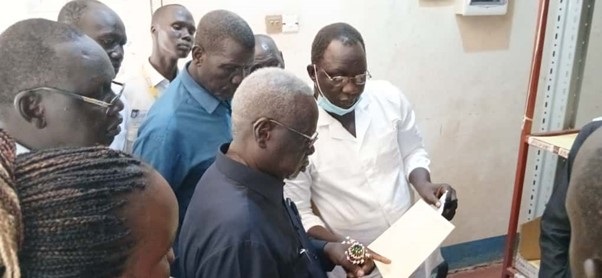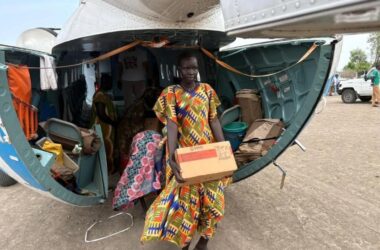By Alan Clement
Bor State Hospital is grappling with a severe shortage of essential medical supplies, especially in its laboratory and pharmacy, raising serious doubts about the pace and effectiveness of promised health sector reforms.
According to a statement from the state’s press unit, the crisis was brought to the attention of authorities during a recent inspection tour of the facility by Governor Dr. Riek Gai Kok.
In a statement, Director General Dr. Reath Kong acknowledged that while service delivery has continued steadily, the facility remains constrained by inadequate equipment and drug supplies.
“We face challenges in the laboratory and pharmacy, particularly with limited supplies,” Dr. Reath said, adding that with support from the state government and partners, they are committed to addressing the gaps.
In a statement, hospital staff reported frequent stockouts of basic antibiotics, laboratory reagents, and diagnostic kits, disrupting timely tests and treatment. Some wards now refer patients to costlier private facilities.
The statement also highlighted patient frustration over recurring shortages. Mary Ajok, a mother of three, said she was forced to buy medicine outside the hospital after being told it was unavailable.
“They tested my child but couldn’t provide the drugs, so I had to buy them elsewhere and many people can’t afford that,” she said.
According to the state’s press unit, Governor Dr. Riek Gai Kok commended the hospital’s staff for their dedication and professionalism during his inspection tour. “We are impressed by the commitment and professionalism of our medical teams,” he said.
The governor also emphasized the need for sustained investment in the health sector and announced the rollout of the World Bank–UNICEF supported Health System Transformation Project.
“This initiative will ensure that Bor Hospital not only retains patients but also begins receiving referrals from neighbouring regions,” he added.
According to the state’s press unit, the project aims to reduce patient referrals to Juba and position Bor Hospital as a future referral hub for neighboring regions.
However, health workers warn that without urgent improvements to procurement systems and supply chains, the impact of the reforms may be delayed.
The Acting Minister for Health echoed the urgency of collaborative action. “We are fortunate to have capable Director Generals and strong partnerships. With continued collaboration, we believe the health sector will see meaningful progress.”
As Bor Hospital remains at the frontline of healthcare delivery in Jonglei, the gap between reform promises and operational realities underscores a deeper need for transparent budgeting, efficient procurement, and sustained donor coordination to ensure that transformation translates into tangible outcomes for patients.




